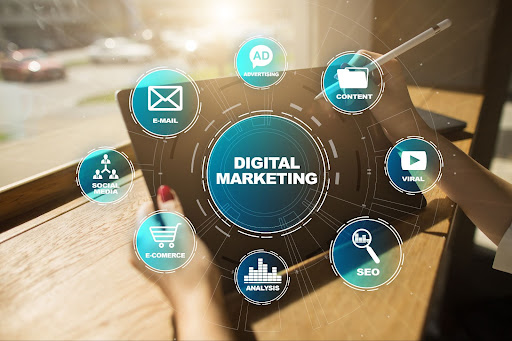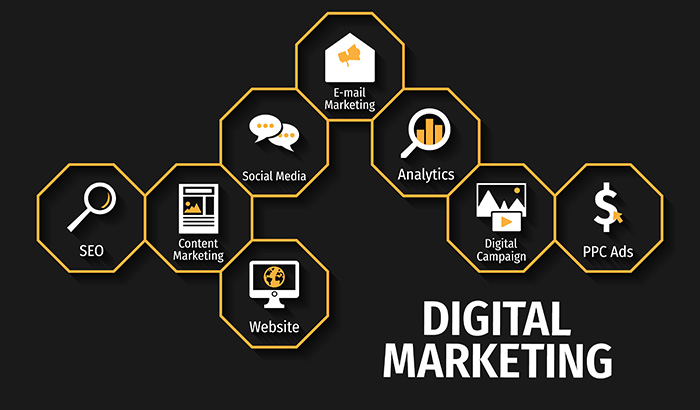Your online presence can make or break your business, so choosing the right marketing agency is a critical decision. Your online presence isn’t just about having a website; it’s about creating a compelling and engaging digital footprint that resonates with your target audience.
Choosing the right marketing agency can help you craft a powerful, engaging, and effective online presence that not only captures attention but also converts visitors into loyal customers.
Digital marketing agencies play a crucial role in helping businesses establish a comprehensive and strategic online presence. They have the expertise, tools, and strategies to enhance visibility, connect with your audience, and outshine competitors. In the hands of the right agency, your online presence becomes a powerful asset that propels your business forward.
In contrast, the wrong agency can lead to wasted resources, missed opportunities, and a lackluster online presence that fails to stand out in a crowded digital landscape.
We are here to empower you to make an informed choice when selecting a marketing agency for enhancing your online presence. From assessing your needs and conducting thorough research to evaluating pricing models and checking references, these tips will serve as your roadmap to a successful partnership that takes your online presence to new heights.
So, let’s get started on this journey to find the perfect marketing agency and transform your online presence into a force to be reckoned with.
Table of Contents
ToggleAssess Your Needs and Goals
Before embarking on your quest to find the ideal marketing agency to bolster your online presence, it’s crucial to begin with a clear understanding of your unique needs and goals. This foundational step will set the stage for a successful partnership.
Begin by taking a close look at your current online presence and marketing efforts. What are you doing well, and where do you see room for improvement? Are you aiming to increase website traffic, boost social media engagement, enhance your search engine ranking, or perhaps all of the above?
To make this assessment even more effective, consider the following questions:
- Who is your target audience?
- What are your key performance indicators (KPIs)?
- Are you looking for short-term gains or long-term sustainability?
- Do you have any specific challenges or pain points that need to be addressed?
Having a clear understanding of your objectives will not only help you in choosing the right marketing agency but also guide them in crafting a tailored strategy to meet your goals effectively.

Determine your budget and resources available for marketing.
Your budget will influence the scope of services you can afford, the size of the agency you can hire, and the strategies you can implement. It’s essential to strike a balance between your budget and your expectations. A realistic budget ensures you don’t overextend your resources and helps narrow down your choices when searching for agencies that fit your financial constraints.
Selecting an agency that specializes in the specific areas you previously identified ensures they have the expertise needed to meet your objectives. Moreover, they can offer a well-thought-out strategy that maximizes your budget for optimal results.

Research Potential Agencies
Now that you’ve clarified your online marketing needs and objectives, it’s time to dive into the process of researching potential marketing agencies.
Thorough research is the bedrock of finding the ideal marketing agency. It saves you from costly missteps and sets the stage for a productive, long-term partnership. There are several avenues to explore:
- Online Searches: Start with a simple online search using relevant keywords. Look for agencies that appear in search results, as this often indicates a strong online presence and expertise in SEO.
- Referrals: Don’t underestimate the power of word-of-mouth recommendations. Ask your network, including business associates, colleagues, and friends, if they’ve had positive experiences with marketing agencies.
- Industry Events: Attend industry-specific events, conferences, and webinars. These gatherings often feature presentations by marketing agencies, allowing you to get a firsthand look at their expertise.
- Social Media: Platforms like LinkedIn and Twitter are excellent for finding and researching agencies. Follow agencies of interest, read their content, and engage with their online community to gauge their knowledge and responsiveness.
- Review Websites: Explore review platforms like Clutch, UpCity, and Yelp, where clients share their experiences and rate agencies. These platforms offer valuable insights into an agency’s performance and client satisfaction.
- Agency Directories: Check industry-specific directories and associations, such as the American Marketing Association or HubSpot’s Partner Directory, for lists of reputable agencies.
As you compile a list of potential agencies, evaluating their experience and expertise is essential, especially within your specific industry.
Industry-specific knowledge can be a game-changer. An agency that understands your sector’s nuances, target audience, and competition is better equipped to develop effective marketing strategies. They’ve likely faced and overcome challenges similar to yours, which means they can hit the ground running.

Evaluate Agency Reputation and Portfolio
As you embark on your journey to find the perfect marketing agency to enhance your online presence, one of the critical steps is evaluating an agency’s reputation and portfolio. This phase of research will help you gain deeper insights into an agency’s capabilities and track record.
Client reviews and testimonials are like windows into the soul of a marketing agency. They provide invaluable feedback from real clients who have experienced the agency’s services firsthand.
- Trust and Credibility: Positive reviews and testimonials build trust. They demonstrate that the agency has a history of delivering on its promises and satisfying its clients.
- Insight into Client Experience: Reading reviews allows you to get a sense of what it’s like to work with the agency. Do clients mention effective communication, transparency, and collaboration? These aspects can significantly affect your own experience.
- Identifying Red Flags: Conversely, negative reviews can reveal potential issues or shortcomings. Pay attention to any recurring complaints or concerns raised by clients.
When researching an agency, make it a point to explore review platforms, agency websites, and social media channels to gather a well-rounded perspective of their reputation.
Importance of examining an agency’s portfolio
An agency’s portfolio is a treasure trove of insights into its capabilities and creativity. It’s like a sampler platter that gives you a taste of what they can bring to the table. Examining their portfolio is crucial.
- Visual Evidence of Expertise: Portfolios showcase the agency’s work in action. You can see the visual elements of their campaigns, such as website designs, advertisements, and branding materials.
- Diversity of Skills: A robust portfolio should demonstrate a variety of skills and services. Look for evidence of expertise in areas that align with your marketing needs, such as SEO, content marketing, or social media management.
- Adaptability and Innovation: An agency’s portfolio can reveal its ability to adapt to different industries and markets. Does the portfolio show a willingness to innovate and explore new strategies?
Make sure to look for more than just pretty visuals. You should seek concrete evidence of their effectiveness and ability to drive results. Here’s what to keep an eye out for:
- Case Studies: These in-depth analyses showcase the agency’s problem-solving skills and the strategies they employed to achieve specific goals. A well-documented case study should include challenges faced, solutions implemented, and measurable results attained.
- Before-and-After Examples: Visual comparisons of clients’ online presence before and after working with the agency provide tangible evidence of their impact.
- Measurable Results: Look for metrics such as increased website traffic, improved search engine rankings, higher conversion rates, and boosted social media engagement. Tangible results speak volumes about an agency’s ability to deliver on promises.
Evaluating an agency’s reputation through client reviews and examining its portfolio offers invaluable insights into its capabilities, trustworthiness, and track record, guiding you toward finding the perfect partner to enhance your online presence.
Consider Agency Services and Specializations
Now that you’ve done your homework on an agency’s reputation and portfolio, it’s time to dive deeper into understanding the range of services they offer and how well they align with your specific needs and objectives.
Marketing is a multifaceted field, and different agencies may specialize in various aspects of it. Here are some key services you might come across:
- Search Engine Optimization (SEO): SEO is all about improving your website’s visibility in search engine results. It involves keyword research, on-page optimization, and link-building strategies.
- Pay-Per-Click (PPC) Advertising: PPC campaigns create targeted ads that appear when users search for specific keywords. You pay only when someone clicks on your ad.
- Social Media Management: This service encompasses creating, scheduling, and monitoring content on social media platforms to increase engagement and brand visibility.
- Content Marketing: Content is king in the online world. Agencies specializing in content marketing can help you create high-quality blog posts, videos, infographics, and more to engage your audience.
- Email Marketing: Email campaigns can be highly effective for nurturing leads and retaining customers. Agencies may offer services such as email automation and segmentation.
- Web Design and Development: A well-designed and user-friendly website is crucial. Some agencies specialize in web design, while others offer comprehensive web development services.
- Analytics and Data Analysis: Data-driven decision-making is key in marketing. Agencies may provide analytics services to track performance and make informed adjustments to your strategy.

Aligning the agency’s specialties with your needs
Selecting an agency that aligns with your specific needs and objectives is paramount to your success. Agencies specializing in the services you require will likely be more efficient and effective in delivering results. They’ve honed their skills and strategies in those areas.
Specialized agencies understand the nuances of their respective services. This means they can tailor their approach to align with your industry, audience, and goals. If you have diverse marketing needs, consider agencies that offer a wide range of services. This can simplify coordination and strategy development across different channels.
Beyond the services offered, it’s essential to understand an agency’s approach and strategies.
- Ask About Their Process: Inquire about the agency’s approach to tackling your specific goals. How do they plan, execute, and measure their strategies?
- Request Case Studies: Case studies can provide insight into how the agency has applied its strategies to achieve measurable results for other clients.
- Discuss Communication: Understand how the agency plans to keep you informed about progress and developments. Effective communication is key to a successful partnership.
- Emphasize Transparency: Ensure the agency is transparent about its methods, reporting, and any potential challenges that may arise during the campaign.
As you explore an agency’s range of services and assess their alignment with your needs and objectives, remember that selecting a specialized agency that not only offers the right services but also shares a transparent approach and effective communication can lead to a productive partnership that enhances your online presence effectively.
Meet with Potential Agencies
Meeting with potential marketing agencies is crucial because it allows you to go beyond what you’ve seen online and get a real sense of the agency’s capabilities, approach, and culture.
Before the meetings, gather all relevant information about your business, goals, and expectations. Having a clear agenda will help you make the most of your time with the agency representatives.
During your meetings or consultations, it’s essential to gather detailed information to evaluate whether the agency is the right fit for your needs. Here are some key questions to ask:
Team Composition
- Who will be working on our account?
- What are their qualifications and experience?
Reporting and Analytics
- How do you measure success and track progress?
- What reporting tools do you use, and how often will we receive reports?
Communication
- What is your preferred mode of communication?
- How often can we expect updates or status reports?
Pricing and Billing
- What is your pricing structure?
- Are there any hidden fees or additional costs we should be aware of?
Strategy and Approach
- Can you outline your proposed strategy for our specific goals?
- How do you adapt your approach to fit our industry and target audience?
References and Case Studies
- Can you provide references from past clients we can speak with?
- Do you have case studies that demonstrate your success in achieving similar goals?

Gauging the agency’s culture and compatibility
Beyond the technical aspects, it’s crucial to assess the agency’s culture and compatibility with your business. Consider these factors:
- Alignment of Values: Are the agency’s values and principles aligned with yours? This alignment can foster a more harmonious and productive partnership.
- Collaboration: Gauge their willingness to collaborate and whether they value your input and feedback. Effective collaboration often leads to better results.
- Flexibility: How adaptable is the agency to changing circumstances or shifting priorities? A flexible partner can navigate challenges more effectively.
- Cultural Fit: Assess whether the agency’s culture and working style align with your organization’s culture. Compatibility in this area can lead to a smoother working relationship.
- Trust and Transparency: Ensure that the agency is open, honest, and transparent in their communication. Trust is a cornerstone of any successful partnership.
Meeting with potential marketing agencies not only provides valuable insights into their capabilities and approach but also allows you to gauge their culture and compatibility with your business—a crucial step in ensuring a productive and harmonious partnership to enhance your online presence.

Discuss Pricing and Contracts
A clear understanding of the pricing and contract details can help ensure a mutually beneficial partnership. Let’s explore the intricacies of pricing models, contract clarity, and negotiation strategies.
Marketing agencies often employ different pricing models to accommodate the unique needs of clients. Understanding these pricing models is vital because it allows you to choose the one that best aligns with your budget and project scope.
- Hourly Billing: Agencies charge an hourly rate for the time spent working on your project. This model is common for smaller, one-time projects.
- Monthly Retainer: You pay a fixed monthly fee for a set bundle of services. Retainers are ideal for ongoing projects or long-term partnerships and provide predictable costs.
- Project-Based: Agencies charge a fixed fee for a specific project or campaign. This model works well for one-time initiatives like website redesigns or product launches.
- Performance-Based: In this model, agencies tie their compensation to specific performance metrics or outcomes, such as increased website traffic or conversions. It aligns their success with yours.
Importance of clarity in pricing and deliverables in the contract
Clarity in your contract is non-negotiable when it comes to hiring a marketing agency. A clear contract outlines exactly what services are included, the associated costs, and any potential additional fees. This prevents unexpected expenses down the road.
The contract should define the scope of work in detail, including milestones, deadlines, and expected deliverables. This ensures both parties are on the same page regarding project expectations.
The contract should also outline terms for termination, dispute resolution, and accountability. It protects both you and the agency in case unforeseen issues arise. Specify the timeline for project completion and the frequency and format of progress reports. This ensures you stay informed throughout the project.
Before signing any contract, carefully review and seek clarification on any unclear points. An agency’s willingness to provide transparency in their contract is a positive sign of professionalism.
Negotiating the terms of your contract is a common practice and can lead to a more tailored agreement that aligns with your budget and goals.
- Discuss Pricing: If the initial pricing doesn’t align with your budget, don’t hesitate to negotiate. Agencies may be open to adjusting rates or finding cost-effective solutions.
- Flexibility in Scope: Consider negotiating flexibility in the scope of work. This can allow you to scale up or down based on your needs or budget fluctuations.
- Performance Metrics: In performance-based contracts, negotiate clear and achievable performance metrics to ensure a fair compensation structure.
- Exit Clauses: Ensure the contract includes exit clauses that allow you to terminate the partnership if the agency doesn’t meet agreed-upon expectations.
A clear understanding of pricing models, contract clarity, and negotiation strategies is pivotal in forging a mutually beneficial partnership with a marketing agency, ensuring that both parties are aligned, transparent, and prepared to achieve your online presence goals effectively and efficiently.

Review and Compare Proposals
Requesting detailed proposals provides a clear roadmap of what each agency plans to do and showcases their commitment to your project.
When reviewing proposals, it’s essential to have a structured approach to compare them effectively. Here’s a checklist to consider:
- Scope of Work: Examine the proposed services and deliverables. Ensure they align with your goals and the agency’s specialization.
- Timeline: Assess the proposed project timeline. Does it align with your desired time frame for achieving results?
- Key Performance Indicators (KPIs): Look for clearly defined KPIs the agency will use to measure success. These should tie back to your goals.
- Costs: Scrutinize the cost breakdown. Ensure it aligns with your budget and that there are no hidden fees or unexpected expenses.
- Strategy: Evaluate the proposed strategy. Does it make sense and align with best practices in your industry?
- Team and Expertise: Review the agency’s team composition and expertise. Ensure they have the skills necessary to execute the proposed strategy.
Importance of understanding what’s included and excluded in each proposal
Understanding what is included and excluded in each proposal is vital for managing expectations and avoiding misunderstandings.
- Preventing Scope Creep: Knowing the proposal’s limits helps prevent scope creep—unintended expansion of the project beyond the initial agreement.
- Budget Management: By understanding what’s included, you can effectively manage your budget and allocate resources where needed.
- Project Clarity: Knowing what’s excluded clarifies what the agency won’t be responsible for. This ensures that you have a realistic view of what the project entails.
- Potential Add-Ons: Exclusions may include additional services that can be added for an extra cost. Understanding these options allows you to make informed decisions.

Check References and Perform Due Diligence
As you approach the final stages of selecting the right marketing agency to enhance your online presence, it’s crucial to perform due diligence to ensure you’re making the most informed decision possible. Checking references and thoroughly researching the agency’s reputation are essential steps in this process.
When an agency provides references, it’s a valuable opportunity to gain insights into past performance and client relationships. Here’s how to go about contacting and interviewing these references:
- Request Contact Information: Ask the agency for contact information for their references. They should willingly provide this information.
- Prepare Questions: Before reaching out, prepare a list of specific questions you’d like to ask. These questions should focus on the agency’s work quality, communication, results, and overall experience.
- Reach Out: Contact the references via email or phone, introducing yourself and explaining your intention to learn about their experience with the agency. Respect their time and availability.
- Ask Open-Ended Questions: During the conversation, ask open-ended questions that allow references to provide detailed feedback. For example:
- Can you describe the scope of the project you worked on with the agency?
- How did the agency perform in terms of meeting deadlines and goals?
- What was your overall satisfaction with their communication and responsiveness?
- Were there any challenges during the project, and how did the agency handle them?
- Did the agency deliver measurable results?
- Listen Actively: Pay close attention to the reference’s responses and any nuanced feedback they provide. This information can be invaluable in your decision-making process.
Conduct background checks and research the agency’s reputation
Performing due diligence goes beyond reference checks. Be sure to conduct a comprehensive background check and research an agency’s reputation.
- Online Presence: Start by searching for the agency’s name online. Look for their website, social media profiles, and any online reviews or mentions.
- Review Websites: Explore platforms like Clutch, UpCity, and Google My Business, where clients often leave reviews and ratings for marketing agencies.
- Portfolio Examination: Revisit the agency’s portfolio and case studies to evaluate their past work and success stories. Assess whether their projects align with your goals.
- Ask Industry Peers: Reach out to industry peers or colleagues who might have worked with the agency or have insights into their reputation.
Feedback from previous clients provides real-world examples of how the agency operates, communicates, and delivers results.
Honest feedback can uncover potential issues or challenges previous clients faced, helping you make an informed decision. Positive feedback from past clients can instill confidence in your choice and reassure you that you’re on the right track.

Revity — Your Trusted Partner for Digital Marketing Excellence
If you’re looking to navigate the digital landscape with confidence, maximize your online presence, and achieve your marketing goals, look no further than Revity Marketing Agency.
Revity is more than just a digital marketing agency; we’re your trusted guides in the digital marketing maze. Our mission is to make your journey easy, stress-free, and, most importantly, effective. With our team of digital marketing experts by your side, you’ll have the support and expertise needed to chart a customized path to success.
What sets Revity apart is our commitment to tailored solutions. We understand that there’s no one-size-fits-all approach to digital marketing. That’s why we take the time to understand your unique business needs and goals, designing a custom plan that aligns perfectly with your objectives.
Whether it’s search engine optimization, pay-per-click advertising, social media marketing, or email marketing, Revity has the expertise to drive your success.
So, if you’re ready to elevate your marketing game and take your business to new heights, it’s time to join forces with Revity. Let us be your partners in turning your marketing dreams into a thriving reality. Get in touch with Revity today and embark on a journey towards digital marketing excellence! Your success story starts here.





